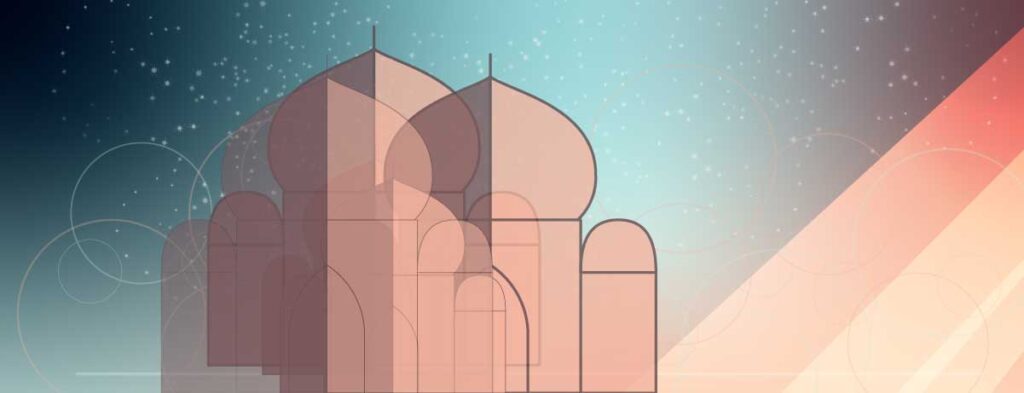In the realm of economics, Christian ministry and mission have typically engaged in microeconomic matters such as tithing, staff salaries, funding of church buildings, missionary support, business as mission, and Christian aid. However, there are few missiological examinations of their macroeconomics.
In today’s world, I believe that Christian ministry and mission (particularly in Muslim contexts) can be renewed by learning fresh economic practices from a study of Islamic economics. This is especially important because of the expansion of Islam’s witness as a progressive religion through Islamic economics and banking.[1] I suggest that Christian mission may be reframed for its task of engaging the greater socio-economic forces in society and within Islam by examining three aspects of the Islamic economy: zakat (almsgiving/tithing), waqf (endowments/trusts), and Islamic banking (interest-free financing).

An Overview of Islamic Economics
Islamic banking and finance are generally seen as Islam’s kinder face before Westerners that showcases its modernization project (which is also key to Muslim mission).[2] In terms of economics and development, there are many differences between Western[3] and Islamic worldviews:
Table 1: Western and Islamic Worldviews[4]
| Western | Islamic | |
| Social Philosophy | • Secularism, liberalism, materialism • Moral values are divorced from political and economic sphere of society • Absolute human freedom to pursue material gains | • Belief and submission to God (ie man serves God, Muhammad is the model, material gains must lead to sharing and justice) • Spiritual/moral journey in living with material realities |
| Education | • Raise human productivity • Higher income produces better living • Money is the source of happiness | • Moral factor in development • Social and economic justice |
| Economics | • Enlightened self-interest and capitalism • Permit free markets to maximize personal gain | • Material and spiritual well-being in cooperation • Exhort people to cooperate between markets and people • Sacrifice for the common cause |
These differences emerged as a result of Islam’s (1) dissatisfaction with capitalist and socialist models and theories of development, (2) rejection of the ideology of ‘catching up’ with the West, and (3) commitment to discern the nature and ethos of economic development from an Islamic point of view.[5] Let us examine three aspects of Islamic economics as examples.
Zakat
Zakat (alms tax) is one of Islam’s five pillars, where Muslims give a fixed proportion of their wealth for specified causes. It is linked to prayer and believed ‘to purify both givers and the wealth which they give’. Without its observance, the efficacy of prayer is negated.[6]
When one gives zakat, one purifies oneself ‘through a restraint on one’s greed and imperviousness to others’ sufferings. The recipient, likewise, is purified from jealousy and hatred of the well-off.’[7] The Quran does not state what and when to give but specifies whom to give to—converts, slaves, debtors, and the spiritually lost (Sura 9:60).
Zakat constitutes 2.5 percent of one’s annual assets, but there are different proportions for different kinds of wealth.[8] Muslims below a certain threshold need not pay, but there is an ‘annual requirement on everyone to pay a small zakat al-fitr (fitrah) to the needy at the end of Ramadan’.[9] Alms-giving during Ramadan is ‘said to be 70 times more meritorious than at other times of the year’.[10]
Waqf: Muslim trusts
A popular Islamic vehicle for transferring assets is through the waqf (Islamic trust), a religious endowment established under shariah law.[11] In modern Islam, the waqf is a corporation—an ‘autonomous organization that the courts treat as a legal person.’[12] Depending on Islam’s schools of law, the administration and execution of waqfs vary, although they do change over time.[13] Generally there is no legal barrier to include non-Muslims among the beneficiaries but non-Muslims have to be free from adultery, drunkenness, gambling, or dealing in interest. If not, their entitlements become void.[14]Waqfs may be formed by pooling the resources of thousands of small contributors, while waqf founders may be governments and firms. The assets that support waqf activities may consist of cash and stocks. Their operations may be overseen by mutawallis (waqf managers or trustees) acting as a board rather than individually.

Islamic banking and interest-free financing
There are over 1,500 Islamic funds globally, operated by 345 Islamic financial institutions in 29 countries with around $200 billion in managed assets.[15] Islamic banking was born of private initiative among Muslim revivalists in Egypt, Pakistan, and Sudan in the 1960s, encountering opposition from secularist regimes.[16] Today Islamic banking is found in Africa, the Middle East, Southeast Asia, and the United States. The banks reflect a Muslim sense that Western capitalism has failed to address economic issues affecting the ummah (Muslim community) such as: (1) the modern banking system’s distrust in low-income earners’ ability to possess sufficient credit or repay loans, and (2) Islam’s challenge that interest-bearing transactions (riba) are the basis for profit and service.
Riba (any predetermined or fixed return in financial transactions)[17] is not permitted in Islamic banking.[18] While riba is often ignored by secular Muslims, Islamic banking ‘avoids’ riba by implementing a profit-and-loss sharing principle (PLS) in two ways—mudarabah and musharaka.
Mudarabah (profit-sharing) financing is when the bank provides capital while the entrepreneur contributes effort and exercises complete control over the business venture. In case of loss, the bank either earns nothing or receives a negative return on its investment, but in the case of gain, the returns are split to a negotiated equity percentage.
Musharaka (profit-and-loss) financing occurs when the entrepreneur and bank jointly supply capital and manage the project. Losses are borne according to the contributions of each party’s capital, but if there is profit, the proportions are negotiated freely.
The PLS ethos is that the ‘relationships between borrower, lender and intermediary are rooted in financial trust and partnership’.[19] PLS leasing and trading are ‘permissible in Islam because they involve entrepreneurial work rather than simply money-lending’.[20] In addition, Islamic banks also make Qard Hassan loans—social or charitable loans to individuals and organizations that need funds or real assets (materials, supplies, etc.), where the return on these accounts comes from a profit-sharing contract with the bank.[21] To mitigate big fluctuations if a bank posts a loss, they may use a ‘special profit reserve that allows them to keep these payouts relatively steady and similar to conventional interest rates’.[22]

Reflections on Islamic Economics for Christian Ministry and Mission
It is important for Christian ministry or mission to understand the material and economic aspects of Muslims because for them, issues of money, finance, and economics are located in a moral and ethical matrix with Quranic theological foundations.
Let us reflect on insights from Islamic economics to reexamine Christian ministry and mission—to see the possibility of new spaces for our life and witness in relation to the socioeconomic dimensions of life.
Ramadan, zakat, and Christian practices
The Christian corollary to Ramadan is Lent, while zakat can be compared to the tithe. In Christianity, Christians are thought to generally give and minister to the poor around Christmastime, but theologically and historically the link between fasting and giving has been just as strong with Lent.
Lent is a 40-day fast observed around February/March and culminates in Good Friday and Easter. Traditionally Lent encouraged Christians to give up various consumeristic or worldly aspects of life. Today Lent may involve fasting from TV, social media, or the purchase of non-essential goods. It is mostly observed among liturgical churches (eg Anglicans, Lutherans, Methodists, and Presbyterians), while most evangelicals do not practice Lent through fasting or solidarity and identification with the poor. Yet the biblical injunction for doing so is clear:
Is not this the kind of fasting I have chosen: to loose the chains of injustice and untie the cords of the yoke, to set the oppressed free and break every yoke? Is it not to share your food with the hungry and to provide the poor wanderer with shelter–when you see the naked, to clothe him, and not to turn away from your own flesh and blood? (Isa 58:6-7) If Christians could recover this link in Lent between fasting, caring for the poor, and social justice, they would highlight a powerful point of commonality with Muslims that is centered around loving Christian witness.
Waqfs, Islamic banking, and riba
While Muslim waqfs play myriad roles in assisting the ummah, perhaps the modern Christian corollary is that of trusts and foundations. However, trusts and foundations are little-known sources of financial support and financing. Historically they played key roles in fighting diseases and funding literacy programs and scholarships. Christian foundations, however, have financed mission by funding printing presses and translating and distributing Bibles. But there is great potential for Christians to be involved in mission in even greater ways.
First, as actors independent of the short-term vagaries of forces in the free-market system, Christians can tackle strategic long-term projects better. Second, they can provide seed money to stimulate giving with nationals (eg matching grants, initial booster funds) for projects requiring large capital expenditures that lay beyond local capacity like funding seminaries, endowing faculty salaries, and resourcing libraries. Third, foundations that specialize in projects such as disease-fighting or community development[23] could fund and assist communities with such needs in mission settings. Finally, Scripture does prohibit lending money at interest (eg Exod 22:25, Lev 25:36–37, Deut 23:19). While Israel could not charge interest amongst themselves, there was no prohibition towards foreigners as long as interest was charged fairly (Deut 23:20; 24:10–15).[24] The church historically opposed usury before the rise of global capitalism in major economic systems, but Christians today have ignored this history. We must address this absence and create better business platforms in Muslim settings that are morally attractive. [25]

Conclusion
A critical assessment of the cultural and religious dimensions of economics raises fresh questions but also provides new approaches as to how ministry can be biblically faithful in today’s economic environment.
If our relationship to economics can assess how modern capitalism has shaped its practices, we can be better prepared to understand how to recover a more holistic gospel that is truly good news to the poor. To do this, more work must be done to integrate the sociocultural and religious dimensions of economics into missiology. May the Lord help us grow in greater wisdom and understanding in this venture.[26]
Endnotes
- John Cheong, ‘Islamic Banking and Economics: A Mirror for Christian Practices in Mission in Muslim Contexts,’ in Christian Mission and Economic Systems: A Critical Survey of the Cultural and Religious Dimensions of Economies, eds. John Cheong and Eloise Meneses (Pasadena: William Carey, 2015), 43.
- Rodney Wilson, ‘Islamic Banking: Opportunity or Threat?’ Islamic City Forum, July 26, 2008, https://www.islamicity.org/forum/forum_posts.asp?TID=12871&title=islamic-banking-opportunity-or-threat.
- This so called ‘Western’ worldview/capitalism/economics/banking system, has been adopted/practised in many parts of the non-Western world.
- Shujaat A. Khan, ‘Two Pathways to Development: Capitalist versus Islamic Approach,’ Hamdard Islamicus 21, no. 2 (1998): 9-11.
- Syed Farid Alatas, ‘Islam and Modernization,’ in Islam in Southeast Asia: Political, Social and Strategic Challenges for the 21st Century, eds. K.S. Nathan and Muhammad Hashim Kamali (Singapore: ISEAS, 2005), 214.
- Jonathan Benthall, ‘Financial Worship: The Quranic Injunction to Almsgiving,’ Journal of the Royal Anthropological Institute 5, no. 1 (1999): 27, 29.
- Benthall, ‘Financial Worship,’ 29.
- Ibid.
- Ibid.
- Ibid.
- Timur Kuran, ‘The Provision of Public Good under Islamic Law: Origins, Impact and Limitations of the Waqf System,’ Law and Society Review 35, no. 4 (2001): 815, 842.
- Ibid, 866.
- Ibid, 871.
- Ibid, 852, 861.
- Doyinsola Oladipo, ‘Global Islamic funds market grows 300% in decade – report,’ Reuters, January 26, 2022, https://www.reuters.com/markets/funds/global-islamic-funds-market-grows-300-decade-report-2022-01-26/.
- Rajesh K. Aggarwal and Tarik Yousef, ‘Islamic Banks and Investment Financing,’ Journal of Money, Credit and Banking 32, no. 1 (2000): 94; Yaroslav Trofimov, “Borrowed Ideas: Malaysia Transforms Rules for Finance Under Islam,” Wall Street Journal, April 4, 2007: A1.
- Aggarwal, ‘Islamic Banks,’ 96.
- ‘Allah permits trade and forbids riba’ (sura 2:275). All Quranic quotations are from Abdullah Yusuf Ali, The Meaning of the Holy Quran, 10th Ed. (Amana Publications, 1999).
- Fadzlan Sufian, ‘The Efficiency of Islamic Banking Industry in Malaysia: Foreign vs Domestic Banks,’ Humanomics 23, no. 3 (2007): 175.
- Trofimov, Borrowed Ideas, A1.
- Aggarwal, ‘Islamic Banks,’ 99.
- Trofimov, Borrowed Ideas, A1.
- Peter Frumkin, Strategic Giving: The Art and Science of Philanthropy (Chicago: University of Chicago Press, 2006), 221-223.
- In the New Testament, Jesus seems to support investment returns by interest (Matt 25:27, Luke 19:23). The biblical data on this is thus varied, necessitating deeper study to understand the full picture.
- Dennis Rodkin, ‘Faith and Finance,’ Chicago Tribune, February 6, 2005, https://www.chicagotribune.com/news/ct-xpm-2005-02-06-0502060481-story.html
- Editor’s Note: See ‘Islam Through the Lens of the Golden Rule’ by Colin Chapman and John Azumah in the July 2018 issue of Lausanne Global Analysis, https://lausanne.org/content/lga/2018-07/islam-through-the-lens-of-the-golden-rule.
